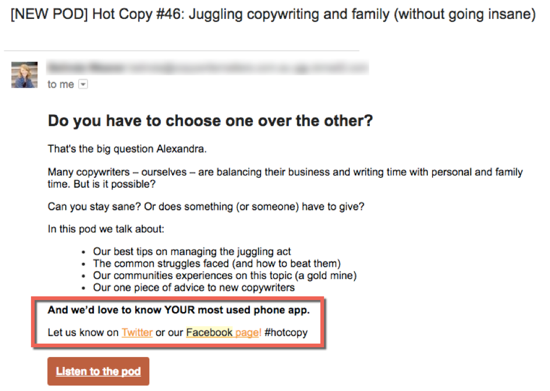How SEO can help your email marketing and vice versa
While many business owners think of email marketing and search engine optimisation (SEO) as two separate things, they can each work to enhance the other.
The connection between the two is not obvious, considering email marketing can’t directly impact search engine ranking. But it can be used to further your SEO efforts, just as SEO can be used to better your email marketing efforts.
Here’s how.
1. How email marketing can help your SEO
There are a few email marketing strategies you can use to boost your SEO efforts. Here are the most effective ones:
Drive engagement with email
Sharing great resources with your subscribers won’t help you rank higher. But if you encourage people to engage with your content – whether by sharing it on social media networks like Facebook, Twitter and LinkedIn, or by adding their comments to your blog articles – this can indirectly lead to more organic traffic.
Here’s the logic behind it: when you have an engaged community of readers that loves your email content and is eager to join in the conversation and to share it with others, the more people you reach with your content.
But getting more visibility for your content also means more visibility for your business.
When people share your content, their friends and followers are also exposed to your business and your brand. This helps you to stay top-of-mind to prospects. So when someone needs the products or services you’re selling, your business will stand a better chance of turning those leads into customers.
For example, say you’re a career coach and you regularly email your subscribers advice and tips on how to overcome career obstacles or how to tackle tough job interviews. When John is insecure about a job interview, or doesn’t know the best way to ask for a raise, your name springs to mind because of your consistent emails or because he saw his friend Max share one of your articles or videos on Facebook. As a result, John looks you up on Google and then sends you an email or gives you a call.
Here’s another benefit: if the content in your emails gets good metrics on social, it’s most likely to get good metrics from search as well because social can be an indicator of how good a piece of content is.
This article by Larry Kim explains that while Google doesn’t use social share counts as a direct ranking factor, it does look at social engagement (number of people who see your status update and click on it and/ or share it) because that shows just how engaging your content is.
His experiment revealed that Facebook posts with very high engagement rates also tended to have above expected organic search clickthrough rates. His explanation is simple: “The same emotions that make people share things also make people click on those things in the SERPs (search engine result pages)”.
So, the higher the engagement, the higher the visibility.
Here are two simple ways to encourage engagement:
- Ask people to leave a comment on your blog about how they’d use your insights to improve your business
- Entice people to be join you on Facebook, Twitter, LinkedIn, YouTube or whichever social platforms you’re on, and add their comments and thoughts there, and not just on your blog.
Take a look at this example:
Refresh your content
You should always strive to improve your existing content. If you write a blog post and share it via email once, that doesn’t mean you should forget about it. People might save it for later or they might come back to it months after you’ve shared it in your email.
When you’re refreshing your content to include better, more up-to-date information, not only are you helping your readers, but search engines will see it as still being fresh. This can keep you ranking high, instead of pushing you down in the SERPs as new similar posts get published.
As you update your content with new information or resources, you can again promote it in an email and invite readers to add their comments. This is also a great way to ensure a flux of fresh content to your articles. Of course, moderate all comments and only keep those that are relevant to the topic and add value to the conversation.
Repurpose email content
If your emails tend to be long and filled with lots of useful information and advice, it’s a shame to not share it with non-subscribers, as they might benefit from it as well. So make sure you turn those long newsletters into blog posts.
But what if your newsletters tend to be short? Figure out which are the most popular pieces and find ways to combine several emails into one blog post, or simply expand by adding more information since space is no issue.
Turning your newsletter content into blog posts can help you achieve two things:
- It allows non-subscribers to read your useful content, and hopefully decide to subscribe to your mailing list.
- It lets you add more quality content on your site, which can help attract more organic traffic.
2. How SEO can help your email marketing
Here’s how you can use SEO to improve your email marketing efforts:
Optimise your emails just like you would any page on your website
This means:
- An enticing subject line
Just like your website’s title and META description tags, your email’s subject line and preheader are meant to spark interest and entice them to take action – in this case, to click to open and read your email. These elements should tell readers what they can expect to find inside the email, and why they should click.
So, just like a page title in the search results, your subject line should be: short, catchy and relevant to the content in the email. If you don’t get these right, they’ll be the only things your recipients will ever see.
- Relevant keywords
You can even research what words people use when searching for what you have to offer and then use them through your emails. Just make sure the keywords you use are relevant to your email content.
Taking the career coach example again, say you’re sending an email to sell your services at a discounted price. It makes sense to use keywords like “career coach services in London” or “experienced career consultant”.
But if your email content is mostly about job interview tips, then you should adapt your keywords to the topic. So, a subject line could be:
- “Here’s how to ace your job interview”
- “Four top tips for job interview success”
For your keywords research you should use the same tools you use when optimising your web pages, such as:
Need more help? Take our free SEO course to learn how to do proper research and build a keyword list that’s relevant to your particular business.
- Original and high quality content
You probably already know by now that search engines are not big fans of duplicate or extremely similar content. The same applies to your email content. Your readers are on all sorts of mailing lists and are tired of reading the same content, the same topics, the same ideas. If you want your newsletters to stand out, be original. That starts with email content that’s original, highly informative and relevant to your readers.
Make sure your content has a subscribe or RSS option
You don’t want to have to rely on your email list to drive traffic to your site.
So giving people the option to subscribe or connect via RSS allows you to convert your organic traffic into subscribers on your mailing list.
Here are some examples on how to do this:
- Link to blog posts in your email, but also encourage people to connect via RSS
- Add a subscribe button on your site and blog and entice them to sign up to your mailing list. You can also give them the option to subscribe to a separate email list that’s dedicated to delivering daily or weekly updates from a specific section of your blog.
Make your emails mobile friendly
Google is cracking down on making websites mobile friendly as mobile usage has overtaken desktop usage. But this doesn’t only apply to websites, it also applies to emails.
Why? Because everyone reads their emails on their phones. So, if you want your readers to engage with yours, you need to make them short, informative and easy to read.
Wrapping up
Now you know how well SEO and email marketing work together and the results they can produce if you just spend a little effort on both. Hopefully you’ll find these tips useful and easy to implement.
How else are you using SEO and email marketing to drive results? Tweet us your best tips @123Reg.




